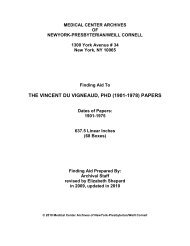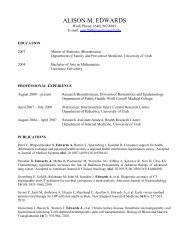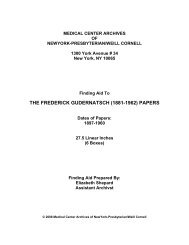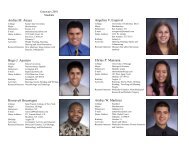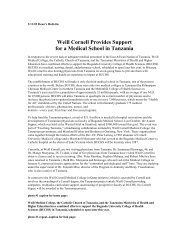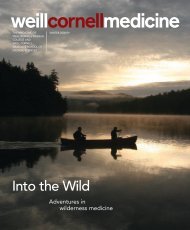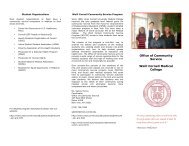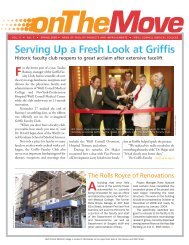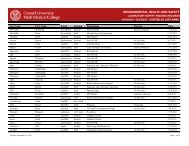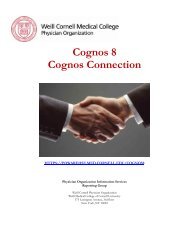Weill Cornell Community Service Program Report 2010 - 2011
Weill Cornell Community Service Program Report 2010 - 2011
Weill Cornell Community Service Program Report 2010 - 2011
You also want an ePaper? Increase the reach of your titles
YUMPU automatically turns print PDFs into web optimized ePapers that Google loves.
Non-active Organizations and Projects in <strong>2010</strong>-<strong>2011</strong><br />
AIDS Teaching <strong>Program</strong> (ATP)<br />
The AIDS Teaching <strong>Program</strong> consists of a group of volunteers dedicated to educating high<br />
school students about sexually transmitted diseases. The curriculum incorporates the most<br />
recent facts about the AIDS epidemic and information about hepatitis. The ATP increased the<br />
number of teaching sites and adopted new strategies for conducting classroom workshops.<br />
Tutors engage high school students in role-playing games, discussion groups, and film-<br />
screenings.<br />
Past events and initiatives included the following: collaborating with the Neighborhood<br />
Shelter for Homeless People; distributing information at the Healthy People Fair; organizing<br />
a team of <strong>Weill</strong> <strong>Cornell</strong> medical students to raise funds for the Gay Men’s Health Crisis<br />
organization; participating in the Annual AIDS Walk; speaking at a session for the Health<br />
Recruitment and Exposure <strong>Program</strong> (HPREP); holding a panel discussion with AIDS patients<br />
as part of AIDS week for the High School students; and arranging to have a psychiatrist, Dr.<br />
Joseph Murray, speak about psychiatric issues of patients with AIDS.<br />
Alive Hospice<br />
Alive Hospice is an organization that facilitates the volunteering of <strong>Weill</strong> <strong>Cornell</strong> medical<br />
students with the Continuum Hospice Care. Joining Alive Hospice will require a two-hour<br />
commitment every other week, which allows students a longitudinal volunteering experience.<br />
Students can volunteer and interact with hospice patients in an inpatient, outpatient, or home<br />
care setting. The hope is that benefits will be reciprocal, so that patients receive care and<br />
attention they would normally not get, while volunteers face issues of death and dying before<br />
they reach their clinical rounds and eventually their residency. Volunteer tasks include<br />
assistance with bathing and feeding, changing bedding, and talking to patients and family<br />
members, and in general offering emotional support to patients and their visitors. Aside from<br />
the aforementioned activities, Alive Hospice plans to host a seminar with doctors who have<br />
experience in the end of life care of patients. The seminars will help future doctors develop<br />
better communication skills in the area.<br />
31



